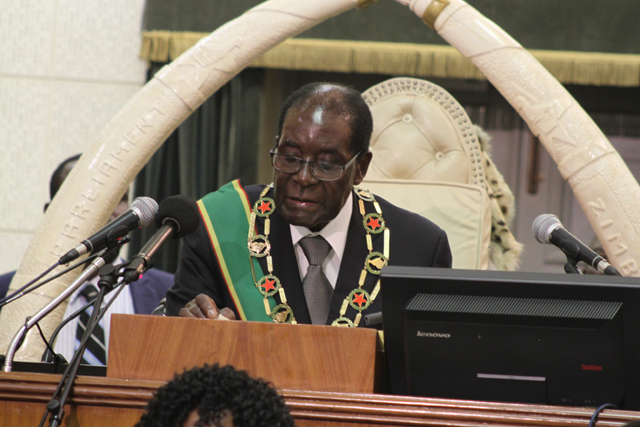President Mugabe’s SONA spot on

Dr Gift Mugano—
President Mugabe on Tuesday presented the state of that nation address which resonate with the realities of the ground. What makes the address more pragmatic to me is the alignment address to issues raised in the ten point plan presented last year. From a policy implementation point of view, it shows that these are not just speeches but call to action. From the President’s speech, I noted three key issues which I felt are interesting for this week’s issue, that is, doing business reforms, enactment of the Special Economic Zones (SEZs) bill and local content requirement.
On doing business, we all know that Zimbabwe, since the turn of the new millennium, has been lowly ranked by the World Bank in its doing business report. For starters, in an effort to address regulatory, transactional and administrative burden which is affecting the business environment for the local and foreign investors, the Government of Zimbabwe, led by the Office of the President and Cabinet initiated the process of implementing the Ease of Doing Business (EDB) Reforms.
The EDB reforms started in September 2015 with the following thematic areas being constituted:
Starting a Business and Protecting Minority Investors;
Enforcing Contracts and Resolving Insolvency;
Getting Credit;
Paying Taxes and Trading Across Borders; and
Construction Permits and Registering Property.
The reforms are being implemented using the Rapid Results Approach (RRA) over a period of 100 days. The EDB reforms targeted both administrative and legislative reforms. Legislative reform is targeting the Companies Act and ancillary legislation. Administrative reforms are centred on reforming the procedural, time and cost elements of the doing business.
To date, thirteen legislative reforms which covers Deeds Registry Act, Small Claims, Commercial Court, High Court, Estate Administration Act, Insolvency Act, Movable Property Security Interest Bill, Reserve Bank Act Bill, Companies Act, Shop Licensing Act, Manpower Development Act, National Social Security Authority Act and Regional and Country Planning Act have been drafted.
In addition to the legislative reforms, the RRA process is also targeting simplifying of business processes. For example, when compared to other countries like Rwanda, the time taken to start a business in Zimbabwe was unjustifiably too long. It used to take 90 days to fulfil nine procedures to start a new business. All these procedures have been eliminated with the implementation of the Ease of Doing Business reforms.
A classic example is the requirement to advertise twice for shop licence notice; this would cumulatively take 55 days. However, with the implementation of the Ease of Doing Business reforms these requirements have also disappeared.
Summary of some of the targets in days/hours that have been achieved as a result of the reforms are as follows:
Number of days to start a business have been significantly reduced from 90 to 30 days;
On construction permits, the days have been reduced from 448 days to 120 days as highlighted;
Property registration now takes 14 days from 36 days; and
Time taken to pay taxes was reduced from 242 hours to 160 hours.
These achievements didn’t come without directive. In his ten point plan, the President called for doing business reforms which the Office of the President and Cabinet (OPC) took seriously and led the process.
In the current SONA, the President is calling for expedience in the implementation of the reforms (starting with the completion of the legislative process). I think the legislative process will be easy since there is buy in from the highest office, implementation of the reforms is key. For successful implementation of the legal framework requires communication (I will come back to this aspect), reconfiguration of institutions (whether coordinating institutions or implementing institutions) and resourcing them, stamping out corruption and enforcing the framework on governance. I guess this is the take away for line ministries and related Government agencies, business and labour.
Communication, knowledge is power. A robust and well-resourced communication framework is needed to educate the masses on these reforms. Here there are no short cuts. Generally, this part, the communication strategy, is overlooked even in donor programmes yet it is the key to changing people’s life through knowledge.
Implementation becomes easy when the citizens and various stakeholders know. On a lighter note, commuter omnibuses conductors cannot short change passengers on bus fare from say Harare city centre to Budiriro for a passenger who is sitting on a full seat or behind the driver (paKadoma) because they know!
On Special Economic Zones (SEZs), World Bank reports shows that well-designed SEZs have been successful as instruments for export-led development, particularly in Asia and Latin America where many zone programmes have been in place for several decades. However, despite high profile successes, many SEZs around the world have failed to meet their potential.
Although multiple factors contribute to the failure of an SEZ programme, in most cases, they can be traced back to the initial planning stages, and derive from an ineffective regulatory and institutional framework.
In common with many other countries in Africa and elsewhere, Zimbabwe sees the development of Special Economic Zones (SEZs) as a critical element of a programme to facilitate private sector investment and transform the manufacturing sector to enhance competitiveness and industrialisation for job creation as enunciated by the President.
Undeniably, SEZs traditionally have been used to address the very constraints facing investors in Zimbabwe and as “quick-win” measures to exploit the potential for private sector driven job creation as enunciated in the Zimbabwe Agenda for Sustainable Social Economic Transformation (Zim-Asset).
It is therefore crucial that the policy and institutional aspects of the SEZ regime are designed and implemented effectively to ensure that it delivers on its potential role as a facilitator of investment, competitiveness, and job creation.
Since the bill has been crafted, and in rallying the President call to operationalise it, it is important the line ministry take care of key principles for designing an effective institutional framework for SEZs: 1) clarity in roles and responsibility and: 2) authority and coordination.
Clarity of roles and
responsibilities
The operation of an SEZ includes the roles of zone owner, zone developer, zone manager or operator, and zone regulator. Up until the 1990s, when most zone programmes remained fully in the hands of governments, it was usual for the same Government body to carry out all these roles simultaneously. This approach remains common in many zone programmes around the world, particularly in East Asia where most zone programmes were established much earlier.
However, not only are few governments experienced in planning and developing economic zones, given the large investments required to support zones and their uncertain return, development of zones can be a risky proposition for governments. Private sector development (or public-private partnerships) can not only provide critical expertise, but can reduce Governments’ risk in zone programmes and ensure greater transparency.
With the growing participation of the private sector in zone programmes around the world, the multiple mandates of Government in the traditional approach to zones is increasingly problematic. Specifically, it creates a conflict of interest, where the Government is responsible for regulating and promoting all the zones in a country, including zones developed and operated by the private sector as well as those developed and operated on behalf of the Government.
Certainly, more often than not it is actually the same Government agency responsible for regulation and the development, so in effect they are regulating themselves. Regardless of the transparency or effectiveness of the regulator, a bias will be perceived by the private sector, which acts as a significant barrier to attracting private sector developers, and becomes a point of contention in cases where disagreements arise.
This overlapping mandate currently exists in Tanzania, with the Export Processing Zones Authority (EPZA) acting as both the regulator of all zones and also the developer and operator of the SEZ. While the SEZ is the export processing zones it was four years before it become operational when the EPZA was established. A Special Economic Zones Act was passed in 2006 but implementing regulations has never been defined.
Development of the zones programme was slow in the initial years in part as a result of the poorly defined institutional framework and the overlapping mandates for the EPZ and SEZ programmes. The EPZA has also been affected by a lack of authority and resources.
The best practice approach to avoiding this conflict of interest is to separate the regulatory role as much as practically possible from the roles of owner, developer, and operator. This allows the regulatory role to remain fully independent from any individual zone. As part of this process, the Tanzanian government with the help of World Bank designed an institutional framework which outlined clearly the specific responsibilities of the different actors, that is, Government, regulator, developer and operator as:
Government
Contacting strategic planning;
Selecting site(s) and package land/establish land use guidelines;
Contact initial feasibility studies;
Select and enter into agreement with the developer;
Develop offsite infrastructure;
Training and delivery of social services;
Regulation and administration of the SEZ programme (see the regulator)
Regulator
Designate SEZs: Designate public and private land as SEZs and public or private SEZ developers and/or operators;
Facilitate Government services: Facilitate licensing, registration and permits (environmental, building, work permits etc), regulate services within the SEZs such as utilities, provide for dispute resolution; the regulator may set fees commensurate with the cost of service delivery.
Monitor compliance: Monitor compliance with the SEZ legal framework, including SEZ policies, standards and requirements, and enforce compliance through appropriate penalties independently from other public agencies.
Developer
Land use planning: Create a final land-use master plan, and prepare the land (grading, levelling, other pre-construction activity)
Provision of infrastructure: internal road networks, drainage and sewerage, and infrastructure for provision of utilities.
Operator
Facility leasing: Managing lease and rental agreements with individual investors and responsibility for main services of the zone (including maintenance, security, etc.);
Transacting utilities: Ensuring provision of on-site utilities (electricity, gas, water, telecommunications) through own provision or via domestic providers.
Provision of other value-added services: May include a wide range of other services including business and training centres, medical and childcare, transport, recruiting, etc.
Marketing: Experienced private developers often have a network of multinational clients across a range of industries to which they can market new SEZ opportunities. Note that the SEZ authority / regulator and other parts of government (such as an investment promotion agency) typically also carry out some marketing activities.
On local content requirements, in addition to the statutory instrument 64, the President called for enhancement of local procurement across all sector to foster productivity, reduce trade deficits, grow fiscal space and improve liquidity. For the record, Zimbabwe’s cumulative figure of trade deficit from 2009 to 2016 is totalling close to $30 billion which is ironically enough to fund the requirements in the Zim-Asset.
On the top list of our major imports is minerals, oils and distillation products amounting to $1,840 billion in 2015. This is followed by machinery and equipment, motor vehicles, cereals, electricals, pharmaceuticals, plastics and fertilisers with imports value of $559 million, $460 million, $410 million, $403 million, $231 million, $203 million and $169 million, respectively.
All these imports constitute 71 percent of our total imports in 2015. In all these import categories we have companies which are actually producing these products. If we work hard in reducing these imports by supporting local products by enacting the local content policy and supporting these companies through a financial facility.
I am happy that the Ministry of Industry and Commerce is working on promulgating local content into law. However, we don’t want to wait for the law to come into place especially on Government procurement. It just requires moral suasion. I have said it over and over that we want to see our Government together with its parastatals deliberately buying local cars, local fertilisers for programmes like command agriculture, etc. Folks, the President has spoken let us continue working hard and believe in ourselves and make the Zimbabwe we want.
Dr Mugano is an Economic Advisor, Author and Expert in Trade and Competitiveness. He is a Research Associate of Nelson Mandela Metropolitan University. Feedback: +263 772 541 209 or [email protected]









Comments